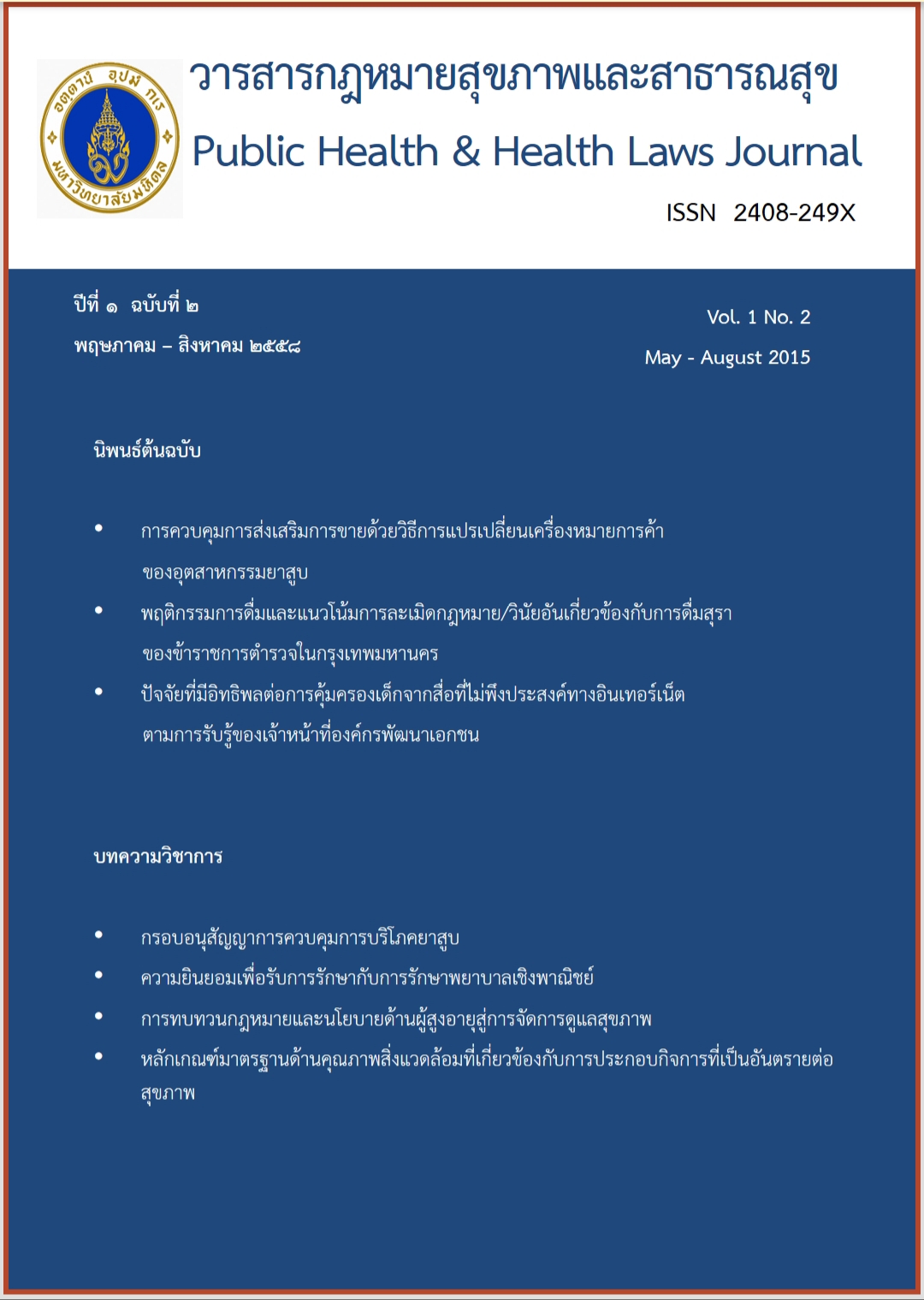Protection of alcohol control policies from the influence of free trade agreement
Keywords:
Free Trade Agreement/, Alcoholic beverages, Asean, Policy Protection, / interference of alcohol industry/trans-national alcohol industryAbstract
Due to complexity and profit-driven nature of global trade, this research utilized analysis of alcohol import statistics and in-depth interviews with relevant academicians and key persons from NGO organizations. Research results indicated that 1) General situation, alcoholic beverages imported were from European Union countries mostly. Some countries took advantages of being ASEAN members, and gained the benefits of zero custom tax. Specific situation, in the southern region where Muslim in the three southern provinces had less strict Islamic religion commitment, Islamic youths drunk halal beer, because of influenced from advertisement and easy access to the duty free zone. 2) Alcohol control policy should treat alcoholic beverages products as no ordinary commodity, and therefore, should be exempted from any free trade agreement negotiations. 3) Surveillance of alcohol control policies in ASEAN should be monitored by NGO organizations, local media networks, Excise department officials and youths networks, These should be coordinated, and collaborated with provincial public health officials. Surveillance direction should be prepared by NGOs, informing the public about interference of trans-national alcohol industry, corruption of politicians or government officials, and conflict of interest among government officials in patronage system. In the past, NGOs network submitted an open letter to the Minister of Public Health, in opposing the alcoholic beverage companies representatives who were part of business entourage under the US-ASEAN Business Council. The trans-national alcohol industry representatives planned to dismantle domestic alcohol control measures and hinder/obstruct the issuance of graphic health warning labels on alcohol beverage bottles, including the measures to prohibit the sale of alcoholic beverages around schools and universities. Thai policy interferences by trans-national alcohol industry was conducted through various front groups (nominies), such as ICAP or TABBA, NGOs would like the Ministry of Public Health to stand firm on public health position, and should not permit any opportunities for meeting with trans-national alcohol industry representatives, and 4) Thailand should join the international community in establishing the Framework Convention on Alcohol Control (FCAC).
The recommendations are to emphasize alcohol problems as a global problem. Everyone should be aware that "No level of alcohol is safe." Therefore, there must be a strict surveillance and monitoring. In the near future, the free trade agreements in ASEAN will allow all non-ASEAN countries to join the trade agreement, Including the Trans-Pacific area countries, The social sector and the Thai government should adjust the focal point, and strengthen domestic alcohol control policy and law, by controlling the alcohol industry, controlling alcoholic market, for both large and small producers, and control consumption, without any situation indicating unfair practices and/or free trade barriers. At the global level, Thailand must coordinate and collaborate in establishing a Framework Convention on Alcohol Control (FCAC).
References
ฉัตรสุมน พฤฒิภิญโญ (2550) สถานการณ์การนำเข้าเครื่องดื่มแอลกอฮอล์จากต่างประเทศ กรุงเทพมหานคร: ศูนย์วิจัยปัญหาสุรา.
ฉัตรสุมน พฤฒิภิญโญ (2551). การคุ้มครองผู้บริโภคด้านสุขภาพ: นโยบาย หลักกฎหมาย และการบังคับใช้.กรุงเทพมหานคร: เจริญดีมั่นคงการพิมพ์.
ฉัตรสุมน พฤฒิภิญโญ (2553). สถานการณ์การนำเข้า และข้อเสนอการนำเครื่องดื่มแอลกอฮอล์ออกจากความตกลงทางการค้าเสรี ใน ข้อเสนอการนำเครื่องดื่มแอลกอฮอล์ออกจากความตกลงทางทั่วไป กรุงเทพมหานคร: ศูนย์วิจัยปัญหาสุรา.
ทักษพล ธรรมรังสี (2552) ความต้องการและบทบาทของธุรกิจอุตสาหกรรมสุรา ในกระบวนการนโยบายแอลกอฮอล์ นนทบุรี: ศูนย์วิจัยปัญหาสุรา หน้า 70-73.
ทักษพล ธรรมรังสี (2553). สุรา กับ การค้าเสรี ความตกลงเขตการค้าเสรีกับสินค้าสุรา: จะเปิดหรือปิด. ศูนย์วิจัยปัญหาสุรา วันที่ 31 สิงหาคม
ทักษพล ธรรมรังสี (2553). สุรากับการค้าเสรี ความตกลงเขตการค้าเสรีกับสินค้าสุรา: จะเปิดหรือปิด. ศูนย์วิจัยปัญหาสุรา วันที่ 31 สิงหาคม
นัดดาเนตร ชื่นวณิช. สถานการณ์การค้าเสรีในปัจจุบันกับสินค้าที่เป็นอันตรายต่อสุขภาพ ผู้แทนจากกรมเจรจาการค้าระหว่างประเทศ กระทรวงพาณิชย์ สรุปการเสวนาค้าเสรีเครื่องดื่มแอลกอฮอล์ ความท้าทายต่อปัญหาทางสุขภาพและสังคมของประเทศไทย วันที่ 25 มกราคม 2553
Anderson P. (2004). The beverage alcohol industry’s social aspects organizations: a public health warning. Addiction; 99: 1376–77.
Baggott R. (2006). Alcohol strategy and the drinks industry A partnership for prevention? First published by the Joseph Rowntree Foundation pp1.
Casswell S, Thamarangsi T. (2009). Reducing harm from alcohol: call to action. The Lancet, Volume 373, Issue 9682, Pages 2247 - 2257, 27.
Editorial . (2007) . A Framework Convention on Alcohol Control, Editorial, the Lancet. www.thelancet.com. Vol 370 September 29.
Ősterberg E. (1993). Implications for monopolies of the European integration. Contemp Drug Probl; 20: 203-27.
Ősterberg E. (1993). Implications for monopolies of the European integration. Contemp Drug Probl; 20: 203-27.
Øystein Bakke. (2007). Developing countries: Promising new markets for the alcohol industry http://www.add-resources.org/developing-countries-promising-new-markets-for-the-alcohol-industry.451944-80613.html
McCreanor T, Casswell, S, Hill, L. (2000). ICAP and the perils of partnership. Addiction; 95: 179–85.
Ministry of Public Health. Burden of disease project (2005). Burden of diesease in Thailand. Nonthaburi, International Health Policy Program, Thailand.
Kelsey Jane (ed) (2010). No Ordinary Deal. Unmasking the Trans-Pacific Partnership Free Trade Agreement, Bridget Williams Books, Wellington.
Kelsey Jane. ‘Trans-Pacific Partnership as a Lynchpin of US Anti-China strategy’, http://web.me.com/jane_kelsey/Jane/TPPA.html
Kelsey Jane. Paper to the Global Alcohol Policy Conference, Bangkok, 15 February 2012, Faculty of Law, University of Auckland, New Zealand.
Room R. (2004). Disabling the public interest: alcohol strategies and policies for England. Addiction; 99: 1083–89.
Room R, Babor T, (2005). Alcohol and public health: a review. Lancet; 365:519-30.
Room R, Babor T. (2005). World Health Organization’s global action on alcohol: resources required to match the rhetoric. Addiction; 100: 579–80.
Smith S, Atkin C, Roznowski J. (2006). Are ‘drink responsibly’ alcohol campaigns strategically ambiguous? Health Commun; 20: 1–111.
World Health Organization. (2010). Draft Global Strategy to Reduce the Harmful Use of Alcohol. 1st ed. World Health Organization, editor. Geneva.
Downloads
Published
How to Cite
Issue
Section
License
Disclaimer and Copyright Notice
The content and information presented in articles published in the Journal of Law and Public Health Policy represent the opinions and sole responsibility of the respective authors. The editorial board does not necessarily agree with or assume any responsibility for the views expressed.
All articles, data, content, images, and other materials published in the Journal of Law and Public Health Policy are the intellectual property of the journal. Any individual or organization wishing to reproduce, distribute, or otherwise use the entirety or any part of such materials must provide proper citation.





